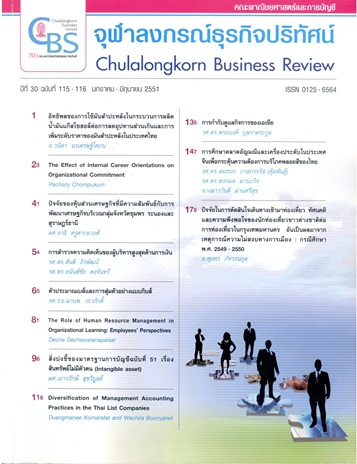The Effect of Internal Career Orientations on Organizational Commitment
Main Article Content
Abstract
บทคัดย่อ
พนักงานมีความแตกต่างกันในแง่ของการมองความสำเร็จของอาชีพ ซึ่งเป็นสิ่งที่ถูกอธิบายไว้ในแนวคิดของแนวทางอาชีพภายใน (internal career orientations) การศึกษานี้ได้ศึกษาผลของแนวทางอาชีพภายในที่มีต่อความผูกพันต่อองค์กร (organizational commitment) โดยเก็บรวบรวมข้อมูลมาจากผู้ที่กำลังศึกษาระดับปริญญาโทในสาขาบริหารธุรกิจ (MBA) ภาคนอกเวลาราชการในประเทศไทย ผลการศึกษาแสดงให้เห็นว่าแนวทางอาชีพภายในไม่เพียงแต่แสดงถึงคุณค่าพื้นฐานที่แต่ละคนมีในการทำงานเท่านั้น แต่ยังมีผลต่อความผูกพันขององค์กรอีกด้วย กล่าวคือ คนที่มีแนวทางอาชีพภายในที่ต่างกันจะมีระดับของความผูกพันต่อองค์กรแตกต่างกันออกไป โดยคนที่มีแนวทางอาชีพภายในที่เน้นความมั่นคง (Getting Secure) จะมีระดับความผูกพันต่อองค์กรสูงสุด สำหรับคนที่มีแนวทางอาชีพภายในที่เน้นความท้าทาย(Getting High) และเน้นความอิสระ (Getting Free) จะมีความผูกพันต่อองค์กรในระดับกลาง ในขณะที่คนที่มีแนวทางอาชีพภายในที่เน้นความก้าวหน้า (Getting Ahead) และเน้นความสมดุล (Getting Balanced) จะมีระดับความผูกพันต่อองค์กรต่ำสุด นอกจากนี้ ในการศึกษายังได้แสดงการนำไปใช้ในการจัดการและการวิจัยในอนาคตไว้ด้วย
คำสำคัญ : แนวทางอาชีพภายใน ความผูกพันต่อองค์กร และการพัฒนาอาชีพ
Abstract
Employees are different in terms of their views of career success, which is described as internal career orientations. The study explores the effect of internal career orientations on organizational commitment. Data was collected from part-time MBA students in Thailand. Results reveal that internal career orientations do not only represent an individual’s work basic values but also influence organizational commitment. Individuals with different internal career orientations hold different levels of organizational commitment. Specifically, individuals with Getting Secure orientations show the highest levels of organizational commitment, individuals with Getting High or Getting Free orientations show the moderate levels of organizational commitment, and individuals with Getting Ahead and Getting Balanced show the lowest levels of organizational commitment. Implications for management and future research are discussed.
Key words: Internal Career Orientations,Organizational Commitment, and CareerDevelopment
Article Details
Opinions and discussions in papers published by the Creative Business and Sustainability Journal (CBSJ) are deemed as personal opinions and the responsibility of the writers. They are not the opinions or responsibility of the Chulalongkorn Business School of Chulalongkorn University.
Papers, content, information etc. appearing in the Journal are deemed to be the copyright property of the Chulalongkorn Business School of Chulalongkorn University. Anybody or any organization that wishes to publish any part of them or use them in any way must obtain written permission from the Chulalongkorn Business School, Chulalongkorn University.


